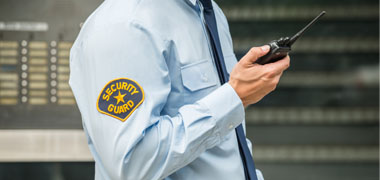
How do I become a security system installer?
Certificate III in Security Equipment
- There are no mandated entry requirements.




Certificate III in Instrumentation and Control
- There are no mandated entry requirements.
 Meo Training
Meo Training
Certificate IV in Electrical - Instrumentation
- Completed Certificate III in Electrotechnology Electrician or equivalent qualifications OR
- A current ‘Unrestricted Electricians Licence’ or its equivalent issued in an Australian state or territory.
 Meo Training
Meo Training
Certificate II in Security Assembly and Set-up
- There are no mandated entry requirements.
 TAFE NSW
TAFE NSW
Certificate II in Technical Security
- There are no mandated entry requirements.
 Comtech Training
Comtech Training
Related occupations
Security Guard
A Security Guard ensures the safety of people and property by monitoring areas, managing crowds, patrolling, and responding to incidents.
Security Officer
A Security Officer maintains safety by managing crowd control, conducting patrols, and monitoring areas while handling any suspicious activity.
CCTV Operator
A CCTV Operator monitors security footage for safety, identifies suspicious activity, and may alert emergency services when needed.
Security Consultant
A Security Consultant advises organisations on improving security systems, assessing risks, designing solutions, and communicating effectively with clients.
Security Manager
A Security Manager oversees security teams, manages staffing and logistics, trains personnel, and provides security advice to organisations.
Private Investigator
A Private Investigator gathers evidence, conducts surveillance, locates individuals, and interviews others, working irregular hours to meet client needs.
Bodyguard
A Bodyguard ensures client safety at events or daily, handling risks, creating security plans, and staying calm under pressure with flexible hours.
Crowd Controller
A Crowd Controller manages behaviour at large events, ensuring safety, conducting risk assessments, and resolving issues while working in a team.
Investigator
An Investigator examines fraud, compliance, and criminal cases by gathering evidence, interviewing witnesses, and preparing reports while ensuring legal compliance.
Intelligence Officer
An Intelligence Officer analyses and interprets information to support national security, assessing threats and ensuring data confidentiality.
Security Dog Handler
A Security Dog Handler manages and trains dogs to enhance safety by patrolling, responding to alarms, and conducting searches for security threats.
Fire Inspector
A Fire Inspector evaluates buildings for fire safety compliance, identifying hazards and ensuring prevention systems are effective.
Common questions
How much does a Security System Installer earn?
In Australia, a full time Security System Installer generally earns $1,400 per week ($72,800 annual salary) before tax. This is a median figure for full-time employees and should be considered a guide only. As you gain more experience you can expect a potentially higher salary than people who are new to the industry.
What are the job opportunities for a Security System Installer?
This industry has experienced an increase in employment numbers over the last five years. There are currently 1,100 people working in this field in Australia and many of them specialise as a Security System Installer. Security System Installers may find work across all regions of Australia.
Source: Australian Government Labour Market Insights
How do I become a Security System Installer?
A Certificate II in Security Assembly and Set Up is an ideal qualification if you’re planning a career as a Security System Installer. This course covers a range of topics including following drawing and specification sheets, fabricating and assembling electronic components and sourcing and purchasing materials. You could also consider a Certificate II in Technical Security, Certificate III in Security Equipment or a Certificate III in Technical Security.
Further reading


Most popular security courses
13th June 2022)

